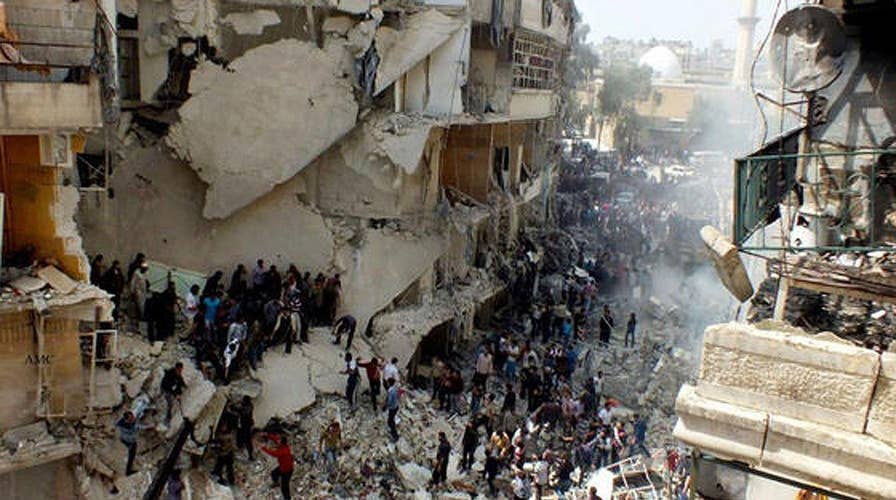State Dept. officials warn Obama's Syria policy not working
Diplomats want the administration to send in airstrikes against Bashar al-Assad's regime; James Rosen has the story for 'Special Report'
The Syrian military declared a unilateral, three-day cease-fire for the entire country on Wednesday, coinciding with the start of the Muslim Eid al-Fitr holiday marking the end of the holy month of Ramadan, state media reported.
The military's nationwide truce is set to expire at midnight Friday, according to a state TV report. The truce is not expected to affect the fight against the Islamic State group, which is battling government troops, rebels and other forces on a number of fronts.
IS claimed a suicide bombing outside a bakery on Tuesday in a Kurdish-controlled part of the northeastern Hassakeh province. It was the third major attack claimed by the group in the final week of Ramadan, following a massive bombing in Baghdad that killed 175 people and an assault in Bangladesh that killed 22.
The Kurdish Hawar News Agency said Wednesday that 20 people died in the bakery bombing, while the British-based Syrian Observatory for Human Rights put it at 25. Syrian state media had initially reported 10 dead on Tuesday.
Conflicting tolls are common in the aftermath of deadly attacks in Syria.
U.S. Secretary of State John Kerry welcomed the Syrian military's truce declaration, saying discussions were underway with Russia and other parties to expand it. Kerry appealed to all parties to honor it to allow for some respite in the country's ongoing bloodshed.
"We very much welcome the Syrian Army declaration of the 72-hour period of quiet in celebration of and in honor of Eid," Kerry said during a visit to Tbilisi, Georgia. "We are trying very hard to grow these current discussions in a longer-lasting, real, enforceable, cessation of hostilities."
There were nevertheless reports of sporadic violence Wednesday.
One rebel group, the Army of Islam, said government forces and allied fighters moved in on a strategic rebel-held town in the Damascus suburbs. Seizing Madya, north of the capital, could potentially sever one of their main supply routes. It said pro-government forces have also kept up their bombardment of the besieged suburb of Douma.
"The government declaration is a way to evade international pressure but it will change nothing on the ground," said Islam Alloush, an Army of Islam spokesman. He said his group would nevertheless hold fire and only respond to government violations.
The Observatory said pro-government militias, including the Lebanese Hezbollah group, have all but seized control of Madya.
Wednesday's announcement is the first time Syrian authorities have declared a blanket truce for the entire country. The last truce -- a high-profile "cessation of hostilities" brokered by the United States and Russia -- was declared on Feb. 27 and excluded IS and al-Qaida's branch in Syria, the Nusra Front.
For weeks, it sharply reduced violence in much of the country. However, the fact that Nusra Front battles alongside other rebels in much of the country opened the door for disagreements over the scope of the cease-fire. Syrian President Bashar al-Assad's government considers all armed opposition to be terrorists.
The cease-fire collapsed in April with a government offensive in the northern province of Aleppo against a coalition of insurgent groups, including the Nusra Front.
On the first day of Eid al-Fitr, Assad traveled to Syria's third largest city, Homs.
State TV showed him praying in a Homs neighborhood that has seen several car bombs over the years. Since nearly all of Homs fell under government control earlier this year, the city has been mostly calm. Assad had recently traveled to the front line in eastern Damascus, another attempt to project confidence amid his troops' new territorial gains achieved with Russia's military and air support.
Elsewhere in Syria, insurgents launched rockets into al-Zahraa, a mainly Shiite town in the northern Aleppo province, killing two children, the Observatory said. It said warplanes struck a rebel-held area in Aleppo city, killing one person and wounding a media activist.
A rescue worker in the rebel-held part of Aleppo city, Bibars Meshal, said government forces dropped barrel bombs on Hraitan, an area north of the city.
In the central Hama province, activist Hassan al-Amari said warplanes targeted the town of Hawash in the Sahal al-Ghab plains, where hard-line rebels, including the Nusra Front, seized territory from the government in April. The plains lie just east of Assad's coastal stronghold of Latakia.








































